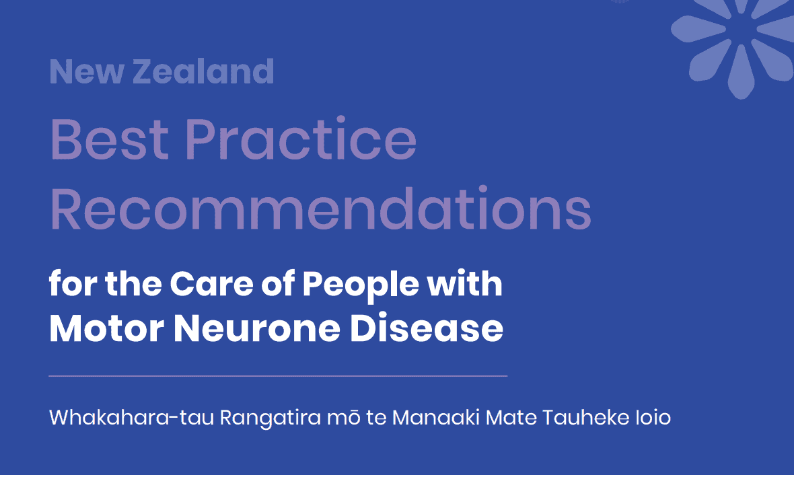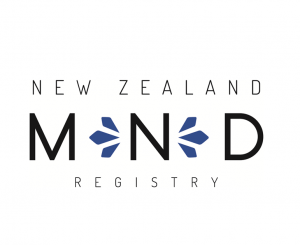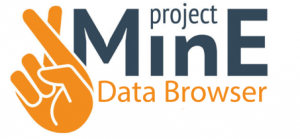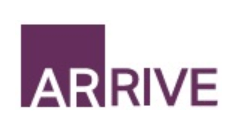Best Practice Recommendations for the Care of People with MND
The first-ever New Zealand based best practice recommendations (BPRs) for the management of MND were published November 2022 by Motor Neurone Disease NZ. Developed by a working group of New Zealand MND clinicians over several years and aimed at health professionals, this document represents what specialists in MND care agree should be the standard of care for any New Zealander diagnosed with MND. The guide draws on best practice clinical guidelines from the UK and Canada and is a significant milestone for standardising world class holistic clinical care for MND in New Zealand. Read the guidelines here.
New Zealand Association of Clinical Research (NZACRes)
NZACRes is a professional association for clinical researchers in New Zealand. Membership is open to all those who have an interest in clinical research and represents a wide range of industry members from the private and public sectors.
The goal is to promote and support clinical research within New Zealand through the provision of networking and educational opportunities, industry resources, and collaborations to address industry issues and create solutions. NZACRes holds regular meetings to bring together members of the clinical research community, to discuss issues and create collaborative solutions for our industry. Click here to read more about the association and membership.
TISSUE BANKS
Neurological Foundation Douglas Human Brain Bank
Centre for Brain Research, University of Auckland
The Neurological Foundation Douglas Human Brain Bank is a world-class scientific resource unique to the Centre for Brain Research. Brain and spinal tissue can provide vital clues about a variety of cell types in situ, including their neuropathology and the pathogenic mechanisms of MND. Please click here for more information about applying to study human MND brain or spinal tissue.
Hugh Green BioBank
Centre for Brain Research, University of Auckland
Expanding on the internationally recognised Neurological Foundation Human Brain Bank, the multi-tissue Biobank provides human tissues and cells in conjunction with clinical, neurophysiological and brain imaging information, for expanded lab-based research on human brain disease. The Biobank secures and significantly expands the human brain tissue and cell bank resources, and encompasses other human tissues (e.g. blood, serum, blood cells, skin fibroblasts, muscle biopsies) for research and diagnostic purposes into human brain disorders.
PATIENT REGISTRIES
NZ MND Patient Registry
Auckland District Health Board, Auckland
The NZ MND Patient Registry enrols people in New Zealand with MND, or with a genetic form of MND in their family, who are interested in participating in MND research. It aims to facilitate participation in research and to help researchers by assisting in the planning of studies and by helping to recruit participants. Please click here for more information about applying for the MND Patient Registry to communicate enrolment details for your study to people with MND. You can also email them directly on mndregistry@adhb.govt.nz
DATABASES
Amyotrophic Lateral Sclerosis online Database – ALSoD
ALSOD collates information about genes and genetic variants connected to ALS. This may include some genes with variants that have been shown to be related to ALS, but the evidence is weak. They also record information about genes and variants that may affect clinical aspects of the disease, for example how long people live after diagnosis. Rather than only show those genes with strong evidence of being relevant in ALS they have kept information about all recorded genes in ALSOD but have categorised the genes based on evidence base.
Global Health Data Exchange
The University of Washington’s Institute for Health Metrics and Evaluation has created the world’s most comprehensive catalogue of surveys, censuses, vital statistics, and other health-related data. It’s the place to start your health data search. They have a useful GBD comparison interactive tool available. Data made available for download by IHME can be used, shared, modified, or built upon via the Open Data Commons Attribution License. To find out more or to access this information click here.
Project MinE
To understand the genetic basis of ALS and to ultimately find a cure for this devastating, fatal neuromuscular disease, Project MinE aims to analyse the DNA of at least 15,000 ALS patients and 7,500 control subjects. The resulting 22,500 DNA profiles will be compared.
Project MinE promotes broad, transparent and responsible data sharing. If you have novel proposals with individual level array data please click here to be taken to the data sharing request page.
Researchers can also access GWAS Summary Statistics that the group have gathered here.
And there is a online Project MinE Variant Browser based on >6400 whole genomes from different European ancestry, and GWAS summary statistics as reported in Nature Genetics. Click here to access this.
PRO-ACT
The Pooled Resource Open-Access ALS Clinical Trials Database (PRO-ACT) houses the largest dataset of ALS clinical trials ever created. It was established by Prize4Life in partnership with the Northeast ALS Consortium (NEALS) and the Neurological Clinical Research Institute (NCRI) at Massachusetts General Hospital, with funding from the ALS Therapy Alliance.
PRO-ACT provides users with easy access to:
- Over 10,700 fully de-identified clinical patient records
- Placebo and treatment-arm data from 23 Phase II/III clinical trials
- Demographic, lab, medical and family history, and other data elements
- More than 10 million longitudinally collected data points
To find out more about how to access this information click here.

Research Equals
ResearchEquals is a new publishing platform (launched in February 2022) for research modules, developed by Liberate Science. Instead of publishing entire projects as papers, researchers publish their process step by step, sharing the building blocks of research continuously and in chronological order. They are different licenses available starting from a zero cost package to various levels depending on restrictions required. More information is available here.
WEBSITES

ALZFORUM
Alzforum is a web-based scientific community dedicated to understanding Alzheimer’s disease and other related neurodegenerative disorders. The website reports on the latest scientific findings, creates and maintains public databases of research data as well as producing online discussion forums. There is a range of publications on MND/ALS which can be easily found via the search box.
ARRIVE guidelines
The ARRIVE guidelines (Animal Research: Reporting of In Vivo Experiments) are a checklist of recommendations to improve the reporting of research involving animals – maximising the quality and reliability of published research, and enabling others to better scrutinise, evaluate and reproduce it.
Items within the guidelines have been organised into two sets to help researchers include the most important information within their manuscript. The ARRIVE Essential 10 are the basic minimum that must be included in any manuscript describing animal research. Without this information readers and reviewers cannot assess the reliability of the findings. The Recommended Set includes items that complement the Essential 10 set and add important context to the study described. Reporting the items in both sets represents best practice. ARRIVE guidelines 2.0 is accompanied by an Explanation and Elaboration document. The website features resources for researchers, journals, funders and other stakeholders.








